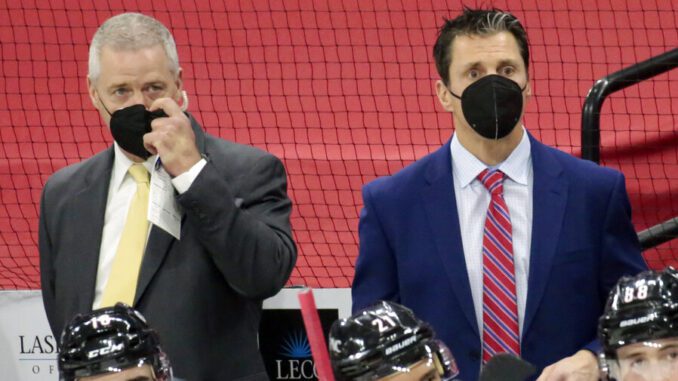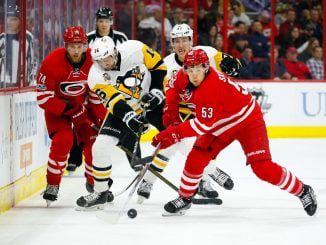
The Hurricanes and Predators would seem like natural rivals, two nontraditional Southern markets separated by 500 miles but united by the fact both teams’ cities, regions and states needed to introduce and grow hockey in places that were mostly unfamiliar with the sport.
But the NHL’s decision to place Nashville in the Western Conference meant the two teams only meet infrequently.
Until this year.
With the realigned divisions formed by the league to limit travel and limit opponents, the Predators and Hurricanes spent this season together in the Central Division, playing eight times in the regular season before now meeting in the first round of the Stanley Cup Playoffs.
The series shifts to Nashville for Game 3 on Friday with Carolina ahead 2-0 in the series. But winning at home in the playoffs is a lot easier than winning on the road, and both markets have shown they can be as hockey-mad as anywhere. The Hurricanes can expect a hostile environment at Bridgestone Arena.
“I think it just took a while for them to figure it out,” Hurricanes coach Rod Brind’Amour said of the success on the Predators franchise. “They haven’t had it here. And now Nashville has been here, I mean, how many years? A long time. And they’ve had success. You gotta have success. You gotta give people something to be excited about to come watch your team. And they’ve done that and so have we, and it’s great to see.”
Perhaps no one knows what it’s like to play in a fledgling market better than Hurricanes assistant coach Jeff Daniels. Unlike Brind’Amour, who was a first-round draft pick and immediate impact player, Daniels had to fight to earn call-ups and ice time during his 15-year pro career.
“It was it was never easy for myself,” the 52-year-old Daniels said. “I had to come to camp every year and with the mindset, ‘I got to make the team.’ Nothing was gonna be given to me.”
And that meant going from organization to organization, from the AHL to the NHL and back again.
That included moving with the Whalers from Hartford to North Carolina in 1997 and becoming one of the first Hurricanes. Daniels played in two games in Carolina’s inaugural season — the first of two that was played in Greensboro Coliseum — before spending a year with the new Predators.
He spent most of Nashville’s first season with its AHL affiliate in Milwaukee but did play nine games with the Predators.
“I got picked up in the expansion draft by Nashville, so I spent a year, mostly in Milwaukee,” Daniels said, “but I did get a taste up here. … The first year you didn’t see the excitement, it was new here. But the people were into it. And then, after that year I signed back with Carolina.”
That meant moving to another new market, Raleigh, as the Hurricanes’ home — the Entertainment & Sports Arena, now PNC Arena — was ready for play.
Daniels spent his last four pro seasons in Carolina, using the lessons learned as a journeyman who played in six different NHL cities and six more minor league towns to become a valuable role player for the Hurricanes. That included playing 23 games during Carolina’s 2002 run to the Stanley Cup Final.
Daniels then transitioned into coaching, joining the Hurricanes as an assistant when Peter Laviolette was brought in to replace Paul Maurice during the 2003-04 campaign. He was part of the staff on the Stanley Cup-winning team that Brind’Amour captained in 2006, then was head coach of Carolina’s AHL affiliate for seven seasons — the first two in Albany followed by five years in Charlotte. Stints in player development and scouting kept him in the organization until Brind’Amour asked him to join his staff when he was hired as head coach in 2018.
Daniels’ experiences as a coach and a player give him a different perspective than Brind’Amour, one that can particularly prove helpful with those who have had to carve out a spot in the league as role players.
“I know what they’re going through,” Daniels said. “I know some nights when they’re not getting the ice time they want or maybe they’re being a healthy scratch, I’ve kind of been through that and I know what they’re thinking and I try to, you know, build them up.”
Steven Lorentz was also a late-round pick who has had to pay his dues in the minors and prove through hard work and commitment that he belonged in the NHL.
“I never really got to watch him play,” Lorentz said, “but I can maybe guess at the kind of style that he played, with that kind of bulldog mentality, back then. So it’s great learning from a guy like that who clawed and scratched, and he obviously faced some adversity over the years.
“But to play as many games in the league as he did and to just stick with it at the end, it just shows a lot about who he is as a person and his character. So it’s great to learn from a coach like that.”
The Hurricanes will try to take a commanding league over the Predators on Friday, and the raucous atmosphere the team and its coaches heard inside PNC Arena in the series’ first two games — probably unimaginable during Daniels’ brief time in Greensboro or the start of his stint in Raleigh — will be replaced by similarly loud ones in favor of the opposition.
Daniels will, first and foremost, be looking to help Carolina leave Nashville on Sunday with a series sweep. But from the Hurricanes bench, he will also be able to experience another successful Southern market that he had a small part in helping build.
“I think it’s huge,” Daniels said. “I even I had a cup of coffee in Florida, too, and just to see the growth down in Florida and all these, I guess, newer — not newer now —Southern markets that people didn’t think hockey would work and, sure enough, you’re seeing that now.”
Both markets needed a lot of hard work and on-ice success to quiet the doubters and prove their worth. It sounds a lot like Jeff Daniels’ three decades in the NHL.




